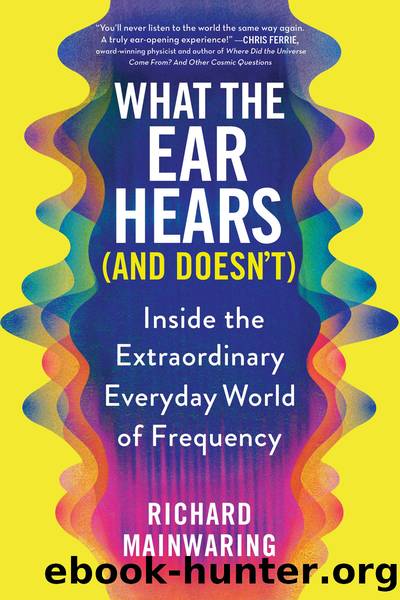What the Ear Hears (and Doesn't) by Richard Mainwaring

Author:Richard Mainwaring
Language: eng
Format: epub
Publisher: Sourcebooks
Published: 2022-01-15T00:00:00+00:00
Mozart Makes You Smarter
Though my teenage listening repertoire broadened to include the likes of Frankie Goes to Hollywood, most of my musical favorites came from the classical genre. The music of Wolfgang Amadeus Mozart has been a companion of mine since I can remember, from the very earliest of my beginnings as a budding violinist at the age of five. I was therefore delighted to discover that my intelligence may have been enhanced by the countless hours I spent listening to Mozart during my formative years. Or this was what the witty and engaging music critic, journalist, and author Alex Ross wryly suggested in a 1994 New York Times article. He claimed that Beethoven was no longer the worldâs greatest composerâMozart had usurped the grumpy genius through a newly discovered side effect. Ross reported that âresearchersâ¦have determined that listening to Mozart actually makes you smarter.â
This throwaway comment created one of the greatest musical myths of the late twentieth century. Within no time at all, the âMozart effectâ was everywhere. Preschool kids were made to listen to the rondo from Eine kleine Nachtmusik while being force-fed nutrient-rich superfoods, and newborn babies were subjected to hour upon hour of Mozartâs twelve variations based on âTwinkle, Twinkle, Little Star.â Ironically, many readers of Rossâs article stopped paying attention after âmakes you smarter,â missing the killer line at the end of the next paragraph, a sneering indictment of the Mozart-as-aural-wallpaper brigade: âIf Mozart makes you smarter, why do Mostly Mozart audiences at the Lincoln Center break into applause in the middle of pieces, after slow movements as well as fast?â (Clapping in between the movements of a concerto or symphony is deemed to be a classic faux pas of the culturally illiterate.) But the Amadeus genie was out of the bottle, and the world went wild for the intelligence formula: developing brain + listening to Mozart = supersmart kids.
There was another fact missed by ambitious parents who were desperate not to raise stupid children. Rossâs reference to a study by researchers from the Center for the Neurobiology of Learning and Memory never mentioned all of Mozartâs music, or IQ, or intelligence, or even kids. The study was focused on a short burst of ten minutes of one single piece of Mozart, the Sonata for Two Pianos in D Major, and its impact on short-term spatial reasoning. In essence, if you listened to just a small section of this specific sonata (though which movement and which section is unclear), you could potentially picture more clearly what your sofa, chair, and TV would look like before you moved them to different parts of your sitting roomâ¦but youâd better do it quickly, as this improvement in spatial reasoning only lasted for around fifteen minutes, a sort of temporary boost of Mozart-induced feng shui.
But why the music of Mozart anyway? Throughout the twentieth century, Mozartâs reputation as a wunderkind who played hard, died young, and had genius musical superpowers placed him in the âone of the best godlike great composersâ category.
Download
This site does not store any files on its server. We only index and link to content provided by other sites. Please contact the content providers to delete copyright contents if any and email us, we'll remove relevant links or contents immediately.
The Complete Stick Figure Physics Tutorials by Allen Sarah(7366)
Secrets of Antigravity Propulsion: Tesla, UFOs, and Classified Aerospace Technology by Ph.D. Paul A. Laviolette(5369)
Thing Explainer by Randall Munroe(3932)
The River of Consciousness by Oliver Sacks(3599)
The Order of Time by Carlo Rovelli(3188)
How To by Randall Munroe(3106)
A Brief History of Time by Stephen Hawking(3022)
I Live in the Future & Here's How It Works by Nick Bilton(2994)
What If?: Serious Scientific Answers to Absurd Hypothetical Questions by Randall Munroe(2700)
The Great Unknown by Marcus du Sautoy(2691)
Midnight in Chernobyl by Adam Higginbotham(2543)
Blockchain: Ultimate Step By Step Guide To Understanding Blockchain Technology, Bitcoin Creation, and the future of Money (Novice to Expert) by Keizer Söze(2493)
Networks: An Introduction by Newman Mark(2405)
The Meaning of it All by Richard Feynman(2354)
Easy Electronics by Charles Platt(2325)
The Tao of Physics by Fritjof Capra(2272)
Midnight in Chernobyl: The Untold Story of the World's Greatest Nuclear Disaster by Adam Higginbotham(2227)
Introducing Relativity by Bruce Bassett(2119)
When by Daniel H Pink(2115)
